Write Us
We are just a call away
[ LET’S TALK AI ]
X
Discover AI-
Powered Solutions
Get ready to explore cutting-edge AI technologies that can transform your workflow!

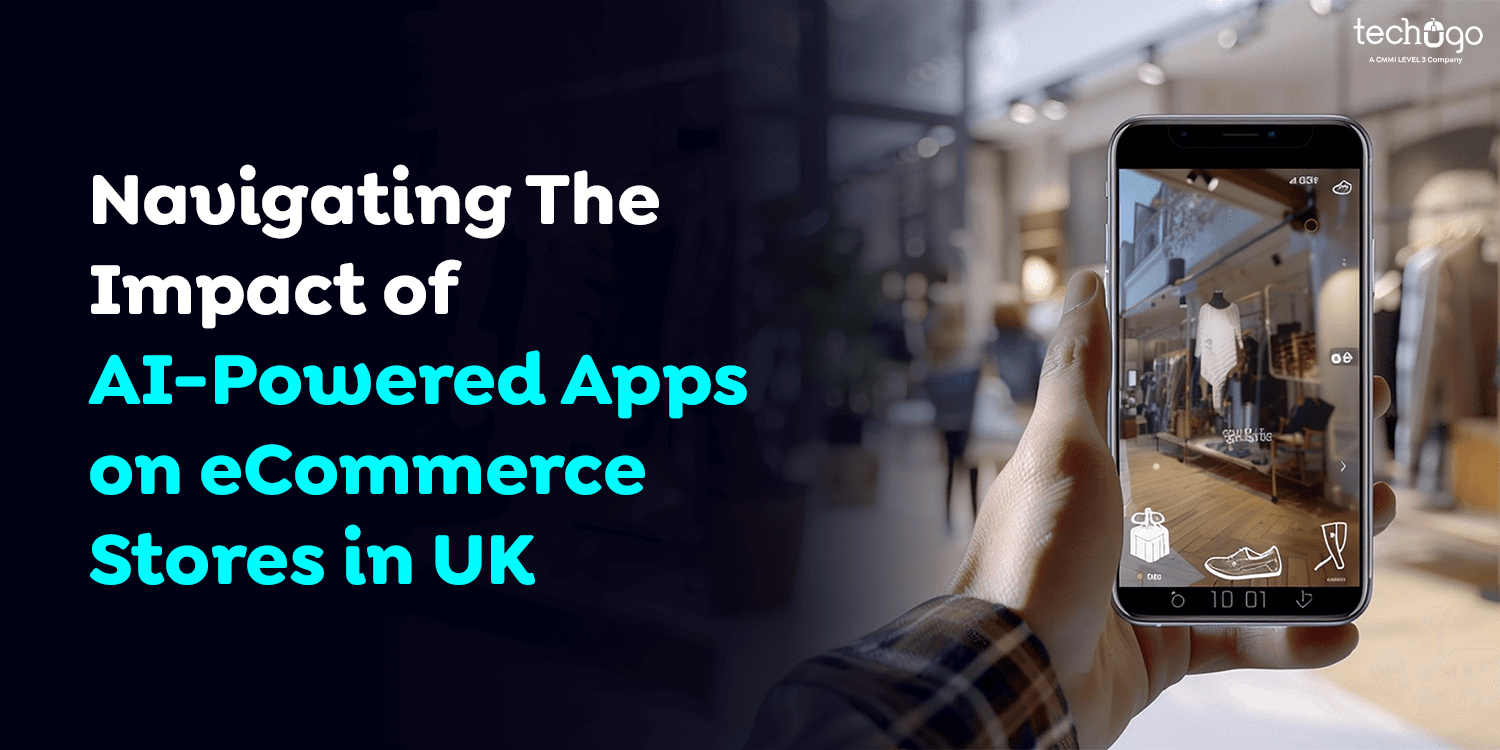
Artificial Intelligence’s rise has become evident across multiple industries, even retail. Large corporations typically utilize AI technologies in their business processes; smaller firms don’t shy away from adopting this emerging tech either. With new AI tools becoming accessible for organizations of all sizes, AI helps increase profits and customer satisfaction.
Regarding AI solutions, ecommerce app development company in UK prioritize learning technologies and algorithms over robotics with human features. AI will help improve both online- and offline user experiences by considering details about customers and businesses to make better business decisions and anticipate future events.
Companies selling products constantly seek ways to improve user engagement; AI can serve as an efficient instrument. AI has revolutionized how people purchase and sell items online, incorporating it with e-commerce applications that provide personalized experiences and advanced functions for buying/selling online products.
This blog will outline how AI-powered apps could positively influence eCommerce stores in the UK.
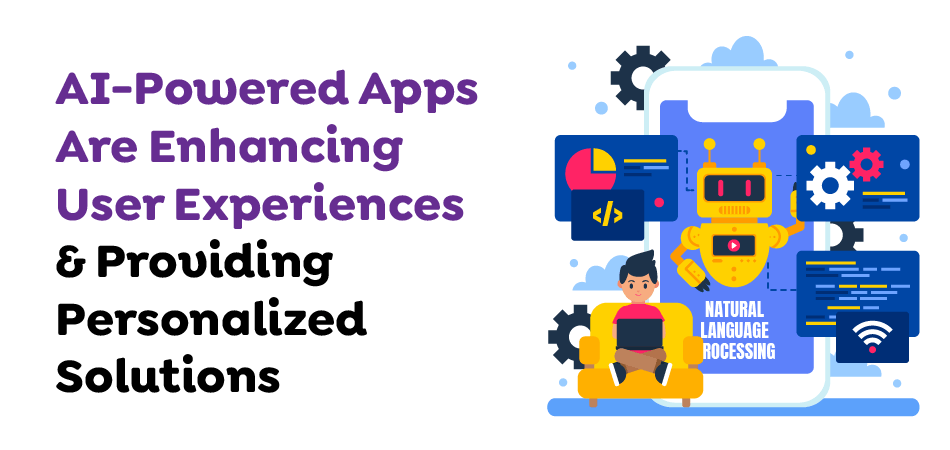
AI-powered mobile apps are applications that use artificial intelligence to execute complex tasks. The apps use the advantages of AI technology for a range of scenarios to provide superior solutions and a better user experience. Mobile apps powered by AI use AI algorithms and ML that allow automated, intelligent, and self-learning functions. Users are empowered to perform new tasks. By using AI-powered apps, they can create human-like experiences and have a personalized user experience.
It combines algorithms with machine learning methods to analyze shopping patterns, control inventory, and recommend products. Also handle customer service, providing customers with an efficient and personalized shopping experience.
The e-commerce industry is experiencing phenomenal growth. According to Statista, global sales are expected to grow to $5.56 trillion before 2027, at an annual compound growth rate (CAGR) of 11.17 percent between 2024 and 2027. Average revenue per user is expected to be $827.40.
The growth in the e-commerce market is mostly due to the wide acceptance of mobile-first and electronic shopping methods. Consumers today prefer the ease of online shopping via mobile apps, avoiding having to travel outside or go to physical shops. As technology improves the way we shop, our behavior and business procedures change accordingly.
Recently, artificial intelligence has been recognized as an innovative technology in different sectors. Within online commerce, AI is a key factor in increasing growth by improving various aspects of an enterprise. The current landscape of online commerce requires improvements in key areas. AI can be instrumental in dealing with these issues and is essential in increasing e-commerce sales by improving customer experience, optimizing operations, and utilizing the power of data analytics to make strategic decisions.
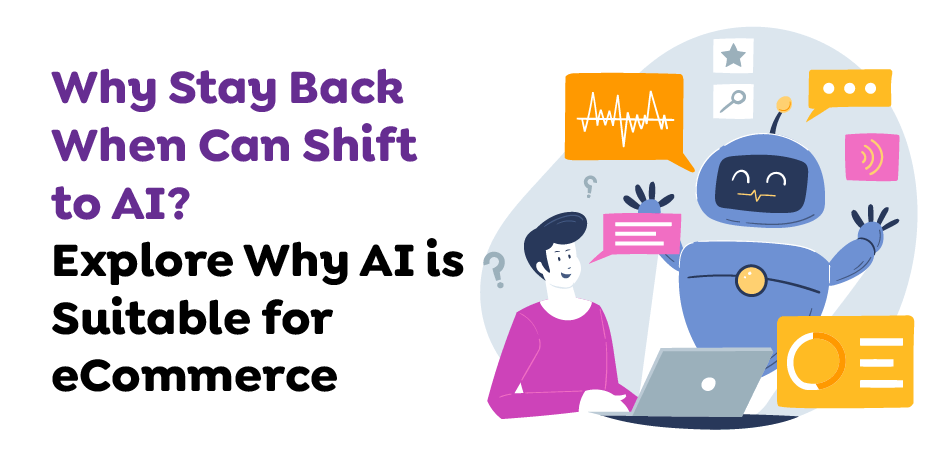
There’s an array of advantages to implementing AI for eCommerce stores and apps. AI is the most cutting-edge technology that is still in its development and offers a variety of advantages that are hard to overlook:
AI technology excels in the analysis of data and, when it comes to the eCommerce industry, data from customers. It can quickly sift through everything from customers’ total visits, most active hours, browsing history, wish lists, order history, complaints/grievances, and lots more. Combining all of this information will offer users highly personalized suggestions throughout all channels, improving the customer experience and boosting the probability of sales.
When properly educated on relevant information about customer service, AI chatbots could become the first stage of customer service. They can respond to customers’ inquiries based on the order record, swiftly resolve issues, and provide tips to provide a positive customer experience. Automating customer service frees up time for dedicated support personnel who can direct their attention toward more innovative and rigorous projects.
Monitoring inventory by hand is an arduous task and prone to errors. This is why inventory management was the most challenging issue for many retail and eCommerce firms just a few years back. By harnessing AI, inventory management can be improved without spending too much time or resources. AI technology, due to its data processing and ability to forecast, will aid in predicting demand for any item.
Based on their predictions, inventories can eliminate the potential of stocking too much, being insufficient, and even having shortages. In the long term, it saves money, improves efficiency, and boosts customer satisfaction, as their favorite products will never be out of inventory.
Dynamic pricing is among the most excellent ways to increase online stores’ revenue through sales of in-demand items. Dynamic pricing means that you can alter the prices of a particular product or range of products in response to various current factors, including competitors’ prices, market conditions, and customer behavior. AI instruments are designed specifically for these types of scenarios. They can be integrated into every vital data source to determine the best price metric to sell your products.
The ability to speak is a fundamental characteristic of AI technology. Its use in e-commerce offers an entirely new and contemporary method of shopping. By using a wide range of commands spoken by voice search technology, shoppers can make purchases, monitor the delivery of their orders, and get prompt answers to the most common questions. This makes for an easy, hands-free shopping experience.
A different characteristic of AI technology is visual or image search, which allows users to find a particular item through an e-commerce site with an image either on the web or locally on their device. This process can take the user extremely close to getting the desired product and provides the most pleasant purchasing experience.
Artificial intelligence is a technology that has modern capabilities. Artificial intelligence is a powerful tool. It could integrate into mobile apps to enhance their abilities and help create novel and creative capabilities. The E-commerce business is on the rise today. Enterprises invest in E-commerce application development to develop feature-driven e-commerce apps. We will look into how artificial intelligence can help the business of e-commerce:
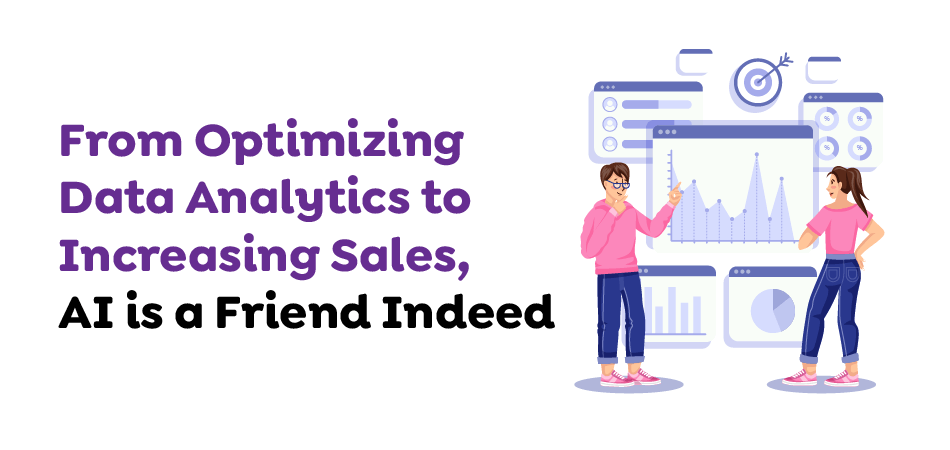
Chatbots are among the major components in the world of online shopping. They’re designed with AI to provide automated features like online customer support, voice assistance, and 24/7 availability. Chatbots are extremely helpful for improving the online user experience. They use text and voice messages to provide similar interactions for interaction with users. Chatbots, therefore, play a crucial role in boosting the conversion rate of sales.
Online retailers can use augmented reality more by utilizing artificial intelligence. A number of the top brands in e-commerce have seen dramatic increases in their sales after the introduction of AR features within their online applications. Customers can make sound buying choices, which leads to sales conversion. With the help of AI and AR in e-commerce apps, numerous innovative functions could be provided to users. Ultimately, it enhances customer satisfaction and then transforms these into sales.
Review reviews from customers are a crucial component of online sales. Each customer reviews their experience before purchasing any item, regardless of price. Reviews are essential in deciding whether to purchase products from e-commerce applications. Thus, the e-commerce application implemented reviews that collect customer feedback to help prospective customers buy appropriate items.
But, scammers or fake buyers typically damage their competitors’ reputations by posting false reviews. Counterfeit reviews can give false impressions of other brands’ offerings. These fake reviews are so prevalent that these fake reviews have also impacted big e-commerce firms. So, AI is the best alternative. AI can detect false reviews by analyzing the content of reviews, such as strange text patterns, formatting, and incorrect wording. So fake reviews can be detected rapidly and accurately.
Here, artificial intelligence in eCommerce and AR technology collide to make online shopping incredibly immersive and enjoyable. Presently, 3D modelling of items can be displayed online via an iPhone, tablet, or computer utilizing AR technology. AI-driven AR marketing software could quickly create online-friendly 3D models for a vast array of items. These 3D models could be included on products on websites that consumers can see in their browsers. Using the AR design in their space, customers can see exactly how a particular item, like chairs, looks when placed in a room similar to their living space, using only their smartphone’s video camera.
Businesses can save considerable cash and energy by efficiently managing their inventory. Through a systematic approach to managing products that are most likely to be sold, maximizing the speed of their operations, and reducing wasted time and money. AI makes inventory management more practical and effective. Apps for e-commerce can speed up ordering and enhance logistics management, inventory management, and overall efficiency by using AI to manage the inventory process.
The dilemma is a typical difficulty for those who shop online. Ultimately, everyone will feel overwhelmed when presented with an array of options. The more choices they have, the less enthused they’ll become. This issue can be solved by revealing people’s needs and narrowing their choices. AI algorithms are skilled in analyzing user’s preferences. Utilizing it to create specific marketing campaigns, suggest products based on past purchases, and predict your future needs. This can bring your mobile app to the highest level.
AI-powered online shopping apps are adept at analyzing information. AI allows e-commerce applications to collect lots of data from consumers efficiently and gather useful data. Business owners can accurately evaluate patterns in buying behavior and anticipate future sales through the use of sales analytics powered by AI and forecasting.
Furthermore, they can increase e-commerce sales by optimizing inventory levels, identifying emerging growth opportunities, and drafting more effective marketing strategies. The e-commerce applications profit from artificial intelligence’s prescriptive power, which reduces risk and improves sales.
It is essential to improve the price of your product promptly. Product pricing is adjusted based on many variables, such as competitors’ activities, seasonal events, the development of new patterns, product popularity, and customers’ reactions to pricing. Thus, online retailers constantly review pricing and consider the growth in sales and competition.
Search is an essential aspect of apps for eCommerce. AI will make the standard search interface more intuitive and effective for UK users. The traditional search bar is limited to displaying results matching precisely what you typed. AI enhances this feature by analyzing the motive behind the search and providing exact results.
AI may provide even more intelligent search features when combined with the natural language process. In the case of AI, a search engine can comprehend queries such as “Show me red dresses under $50.” This degree of sophistication can help users locate precisely the information they’re looking for.
Apart from generating product descriptions, AI tools for writing are also helpful in composing emails. Instead of starting from scratch, consider selecting an existing topic and adapting its contents according to your desires. It is also possible to have an AI mail writer create an email reply in the right tone. Many AI email writers include the SEO option and an integrated inbox to aid with the marketing of emails. Marketing professionals can simplify their jobs with this AI software and keep a consistent look for marketing.
Although building an eCommerce application or store equipped with AI features is thrilling, having a proper plan and plan is essential. This can help keep you in line with the results you’re trying to reach while minimizing the amount of time and money spent accomplishing tasks that would otherwise be incongruous.
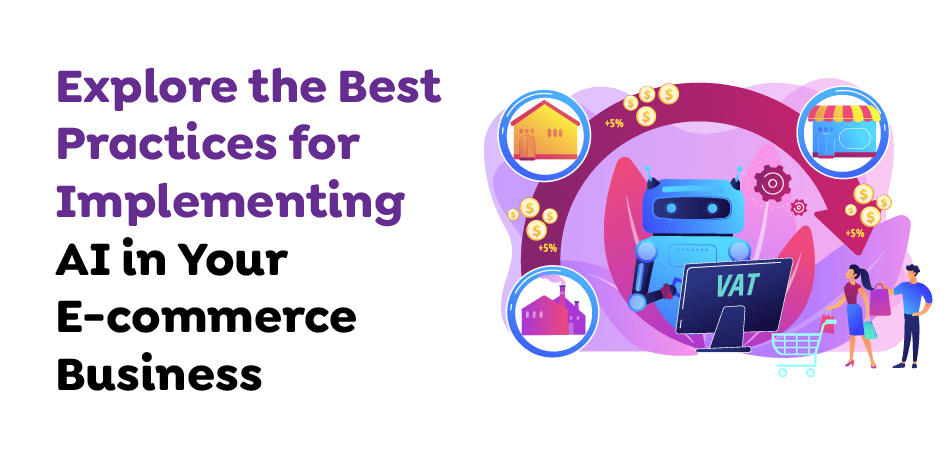
This is a fundamental procedure that is often overlooked. Before jumping onto the AI wagon, be sure you know the goals and results you want to accomplish from the other end of its implementation. Think about it and consult with artificial intelligence app development company, CTOs, and bespoke business marketplace development providers to gain complete certainty. Develop a concrete plan and roadmap for the AI process. Divide your journey into smaller and achievable steps. After you begin making good progress, you can increase your pace.
To determine the most appropriate use cases for your eCommerce marketplace or store, ensure you have a comprehensive view of your company’s goals, including data diversification and the ease of accessing artificial intelligence models. This allows you to capitalize on revenue-maximizing opportunities within your business and leverage popular AI technology.
Suppose you have the right team to handle all implementation tasks. In that case, seeking an external opinion is an excellent idea. Engage a third-party team to look at the AI eCommerce store’s requirements and ask them to recommend the most effective method to get everything done. The experience of an experienced MVP model development service provider could help the project get up and running and bring the MVP (minimum acceptable product) version to fruition.
If you’ve set up a good MVP, the next step is moving slowly to a larger-scale solution. Your team understands how to work using AI technology. However, it could be a while until you have the final solution. Once you and your group are comfortable working in the AI-driven ecosystem, you will appreciate the many benefits technology can provide.
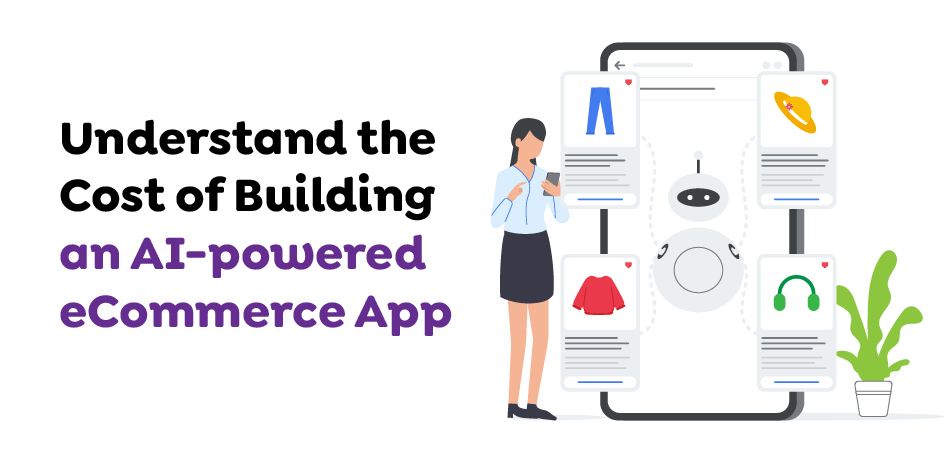
In general, the expense associated with building an AI-powered e-commerce mobile application is in the range of $40,000 to $80,000. This is an approximate estimation. However, the figure given is not definitive because the actual cost will depend on a myriad of variables. AI, as a complex and sophisticated technology, requires a lot of expertise and advanced programming to ensure its successful integration of mobile apps.
To better understand the costs required to create an AI-powered mobile application for the e-commerce industry, it is recommended that you speak directly to a specialist E-commerce app development firm. Their expertise and knowledge can provide a better-tailored and accurate estimate based on the particular requirements and complexity of the proposed AI integration.
The article discusses how advantageous AI is for eCommerce success in enhancing customer experience and maximizing profits. However, eCommerce businesses must face various issues; some come from the tech itself, while others arise from using the technology. Let’s review each of them in more detail:
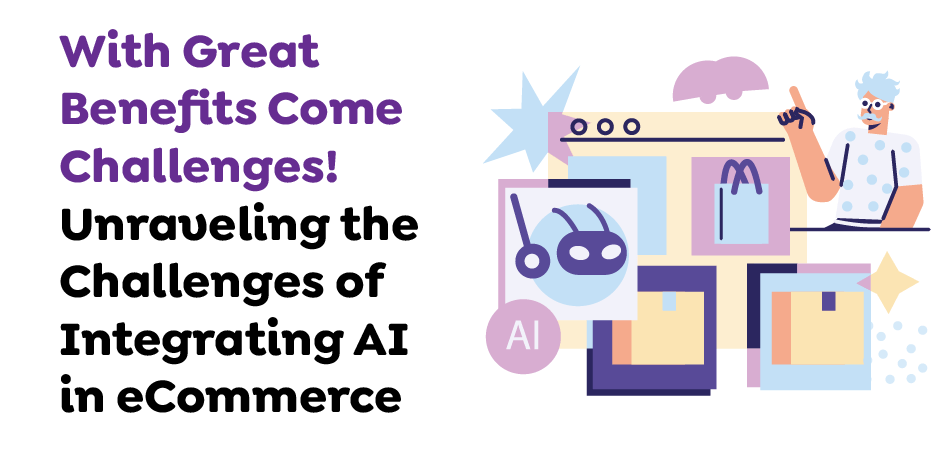
Data is what is the engine that drives AI technology. It is the base for a variety of forecasts, as well as personalized offers and more. Possessing as much high-quality data as possible is essential to make the most of this type of technology. Data collection, cleansing, and privacy compliance are enormous investments that many startups in the early stages of e-commerce businesses seem to overlook.
It is not the case that all eCommerce firms are at the forefront of technology. Many of them still use old systems that are in use. Companies adopting AI technology face considerable challenges. When integration is feasible, it’s not without expenses and complications. For others, when there’s no solution, it is imperative to overhaul the existing infrastructure. Both scenarios are imperfect for AI adoption. Consultation with an online developer service provider could clarify these issues.
Although AI has been making waves throughout the e-commerce market, its complete use is limited to the top e-commerce companies in the field. Most smaller and mid-sized eCommerce businesses cannot cover the expenses involved in creating and integrating AI solutions. This technology is still relatively new, and, as such, securing the best employees, acquiring the required equipment, and creating AI models can be a pricey task.
It’s been mentioned that AI technologies depend on data, as well. You’ll handle a wide array of customer data in an eCommerce-related business. It’s when things become difficult. There is a variety of compliances and rules that govern how companies can make use of or not make use of customers’ information. The most widely acclaimed include GDPR as well as CCPA.
For businesses who want to integrate an eCommerce application incorporating AI capabilities to enhance their business and processes, ensuring they comply with data protection laws is crucial. Otherwise, it could result in some unwanted severe outcomes.
Suppose an AI model has the bias of a particular notion, idea, or view expressed in the training data. It later uses bias to inform all of its decisions. In that case, bias is referred to as bias in the algorithm. To combat this issue, it’s necessary to have regular data audits and check for bias mitigation on training data to ensure confidence and fairness. If this is not checked, it could lead to unsatisfactory or biased results, which defeats the purpose behind AI-controlled automation.
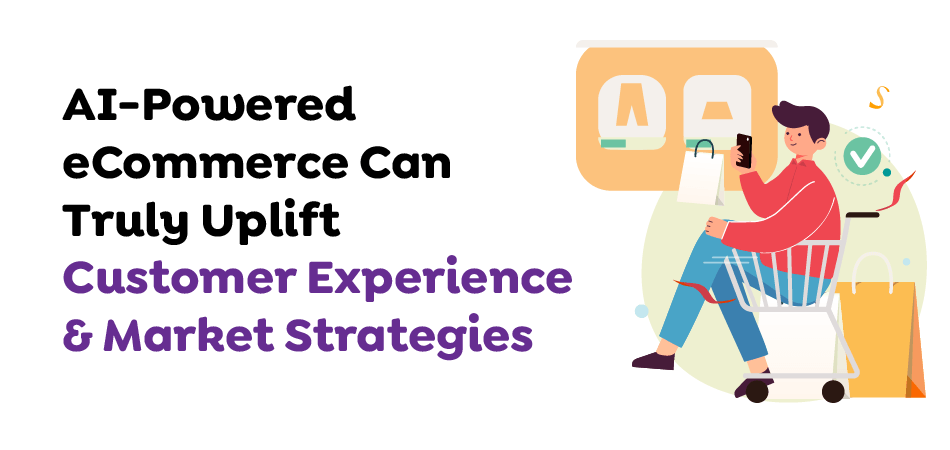
The world of eCommerce is on the verge of an era-changing shift fueled by AI. While AI is rapidly developing and affecting retailers, its impact is obvious, demanding attentiveness and thoughtful adaptation as technology develops. Modern AI technology is expected to appear first in the biggest eCommerce companies. These retailers offer their products through more significant marketplaces since their offerings are promoted or relegated using AI, which could enormously impact marketplace sales.
Virtual assistants will continue to develop and become a more significant element of the buying process when customers begin using them to create shopping lists, plan events and getaways, and tackle home improvement projects. Products and services recommended by virtual assistants will likely gain a significant market share, and selecting a product is typically delegated to AI.
B2B sales firms will be increasingly utilizing AI to enhance the buying experience for customers by using AI to separate their customer base and offer more customized and effective purchasing options, saving time and money for their clients. A lot of the technology used by B2C and B2B space in the present, like products, search catalogs, and inventory management, will evolve to incorporate the latest AI techniques, improving performance over more basic algorithms. Companies that can effectively use the latest AI techniques will offer an improved customer experience over other companies and enjoy an operational advantage that will help them increase their market shares.
As privacy legislation for data grows, AI will become increasingly crucial in filling data gaps, especially when observational data is not allowed. It will affect analytics tracking and optimization techniques of marketing campaigns and commerce-specific targeting. Businesses that employ AI techniques to bridge the gaps in these areas can improve their marketing campaigns and beat out their competitors in lead acquisition.
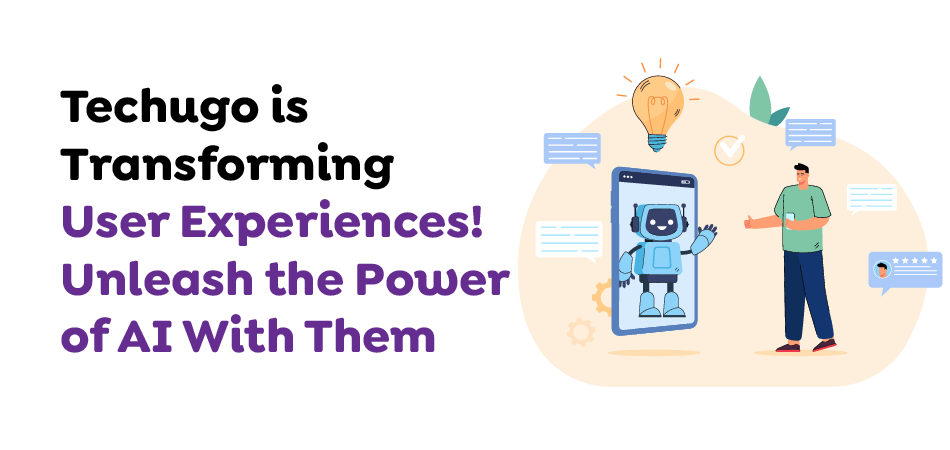
Artificial intelligence is a revolutionary technology. It makes mobile apps more efficient and has new capabilities for top-of-the-line processes. By incorporating AI into e-commerce applications, businesses can use the latest technology to boost revenue growth. Nowadays, as competition is increasing and consumer behavior is changing, the use of AI can enable mobile apps to simplify existing systems and offer a more enjoyable customer experience. AI helps mobile apps for e-commerce improve their systems and ultimately provide the best browsing experience. This, in turn, helps boost business growth.
Techugo, a reputable mobile app development company in UK is known for its efficiency in incorporating AI into e-commerce apps. With their expertise, they have successfully integrated AI technologies into mobile applications, allowing businesses to harness the power of artificial intelligence for enhanced user experiences and improved efficiency. Techugo’s commitment to leveraging AI in mobile app development has helped businesses stay ahead in the competitive e-commerce landscape, providing innovative solutions that align with the evolving needs of consumers. Have more doubts? Get in touch with Techugo to clear them all and befriend AI!
Write Us
sales@techugo.comOr fill this form